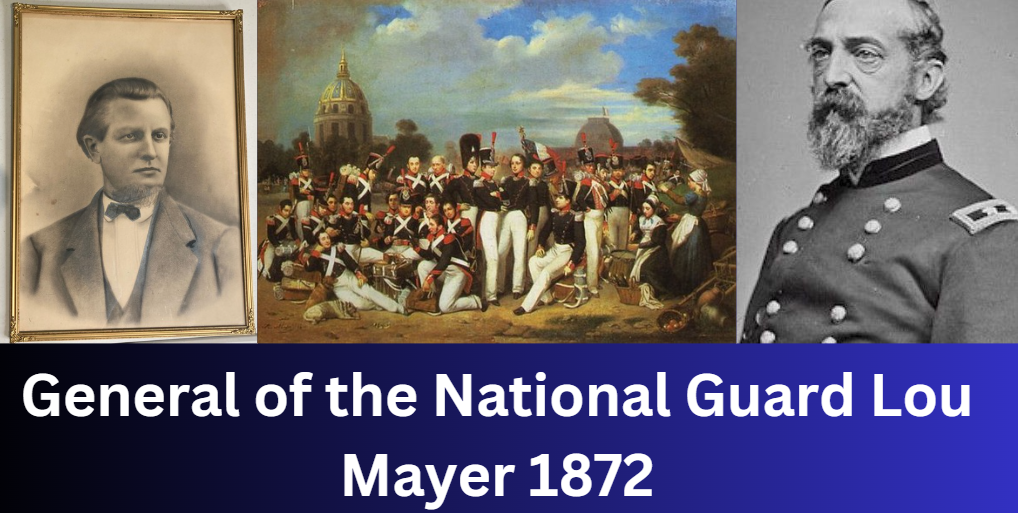
The U.S. National Guard has a rich history that dates back to the earliest days of the country. As an essential part of American defense, it has played an integral role in both national security and domestic matters.
However, when searching for “General of the National Guard Lou Mayer 1872”, it becomes apparent that detailed records of this individual remain elusive.
In this article, we will explore the National Guard’s evolution during the 1870s, discuss the potential role of Lou Mayer, and review the broader historical context in which figures like him might have served.
The National Guard in 1872: A Defining Moment in American History

The Post-Civil War Transition
In the aftermath of the American Civil War, the National Guard found itself in a state of transition. The period around 1872 marked a time of transformation for the Guard, as the nation was recovering from the effects of war and adjusting to new political, social, and military realities.
The National Guard, originally formed as state militias, had gained national significance after the Civil War and was now transitioning into a more standardized and formalized role.
At the time, the National Guard was still under state control, meaning each state had its own independent militia force, but they were increasingly called upon to serve in a federal capacity during times of national emergency.
This period also saw the National Guard becoming involved in frontier defense, Indian Wars, and addressing domestic uprisings, including labor disputes in industrializing areas.
A Unique Structure: State-Controlled but Nationally Deployed
The National Guard was primarily state-funded and commanded by state governors, but the federal government could call these units into service.
This unique structure allowed the Guard to serve as an organized force for both state-level crises (like natural disasters or civil unrest) and federal duties, particularly in frontier defense and war.
While the U.S. Army was the primary military force of the country, the National Guard’s role during this period was critical for domestic stability.
This growing importance meant that many National Guard leaders began to gain more recognition, even though records from this era can sometimes be fragmented.
Who Was General Lou Mayer?

The Mystery of Lou Mayer’s Historical Presence
Despite the search for General Lou Mayer of the National Guard in 1872, there appears to be no readily available historical record or notable documentation confirming the existence of an individual by this name serving in such a capacity. The absence of primary sources leaves us to consider several possibilities:
- Local or Regional Role: It is possible that Lou Mayer was a local military leader, or perhaps even a commander of a smaller unit within a state militia, whose contributions were significant in specific state conflicts but didn’t reach national recognition.
- Incomplete Historical Records: The 19th century was a time of considerable upheaval, and many individuals serving in various military roles often did not achieve widespread documentation or fame, especially if they were not involved in significant national conflicts.
- Alternate Naming or Spelling: There could also be the possibility that “Lou Mayer” is a variation of a name recorded differently in historical records, and the details of his role have been lost or altered over time.
While the mystery surrounding General Lou Mayer remains unresolved, understanding the broader context of the National Guard during the 1870s can provide some insight into the types of individuals who may have played crucial roles during that period.
Key National Guard Roles and Responsibilities in the 1870s

Defending the Frontier: The Indian Wars
In the years following the Civil War, the United States was engaged in a series of conflicts with Native American tribes, collectively known as the Indian Wars. National Guard units played an important role in these efforts.
While the U.S. Army was the primary military force, the National Guard was often called to supplement federal forces, especially in remote areas of the Western Frontier.
National Guard units were instrumental in protecting settlers, securing transportation routes, and supporting federal military operations.
Generals and officers from the National Guard were crucial in organizing and leading these forces during the frequent skirmishes that marked the era.
Domestic Affairs: Civil Unrest and Labor Disputes
The 1870s were a decade in which social and industrial development was taking place throughout the U.S., thereby witnessing a great deal of civil unrest. Workers now came together and demanded greater changes in working conditions, fair wages, and also workweeks.
The great rail strike of 1877, which took place after 1872 by almost three years, can illustrate how National Guard units used to suppress strikes and labour protests.
During this period, generals in the National Guard had to tread a very thin line between military response and keeping civilian order.
The leaders of the National Guard were often tasked with keeping public safety during strikes, protests, and uprisings, and at times they found themselves caught in difficult positions where they had to balance their duty to both the government and the people.
The Uncertainty of Lou Mayer’s Historical Role

Given the lack of substantial documentation, it’s important to acknowledge the possibility that General Lou Mayer may have been a minor or unknown figure whose contributions to the National Guard were limited to local affairs or smaller skirmishes not widely recorded in national archives.
Additionally, with the Guard operating at a state level during this period, many officers were not universally recognized beyond their local communities.
Nevertheless, even if Lou Mayer is not remembered in national military history, the National Guard’s role during the 1870s remains pivotal in shaping the future of military service in the U.S.
It is through the collective actions of countless lesser-known generals and officers that the National Guard became the highly organized and professional force it is today.
Frequently Asked Questions (FAQs) about General of the National Guard Lou Mayer 1872
Who was General Lou Mayer of the National Guard in 1872?
Unfortunately, historical records do not seem to support the existence of a General Lou Mayer in the National Guard in 1872. The figure may either be a local leader whose contributions went undocumented or a misrecorded name. Further research may be required to confirm the specifics.
What was the role of the National Guard in 1872?
The National Guard in 1872 was involved in domestic defense, frontier protection, and responding to civil unrest. The Guard supported federal forces during the Indian Wars and helped manage strikes, protests, and labor disputes as industrialization progressed in the U.S.
Was the National Guard fully integrated with the U.S. Army by 1872?
No, the National Guard was still primarily state-controlled in 1872. Although it could be called into federal service, the Guard’s relationship with the U.S. Army was not fully integrated at that time. It remained a crucial component of national defense, serving both state and federal needs.
How did the National Guard evolve after 1872?
Following 1872, the National Guard continued to professionalize and formalize its structure. As the U.S. military became more cohesive, the Guard’s role in national defense grew, especially during the Spanish-American War and World War I. The Guard became more integrated into the larger military structure, ensuring it was prepared for both local and national emergencies.
Conclusion: The Legacy of the National Guard and the Mystery of General Lou Mayer
The mystery of General Lou Mayer is left unsolved, but the history of the National Guard in the 1870s does form a critical chapter for the establishment of modern forces.
In this role and in its participation in activities such as responding to crises at home, defending the frontier, and civil defense, it would eventually earn its place of importance in the nation.
To General Lou Mayer, contribution, whether documented or not, would form part of the broader fabric that made the National Guard a very relevant institution in American defense history.
Affiliated Posts Like General of the National Guard Lou Mayer 1872
IP Address 70.228.123.178 What Model and Device Manufactor?
Phison APS-XS03-240 SCSI Disk Device: Performance, Features, and Applications Explained
Does a 5.9 Valve Cover Fit n a 6.7? Here’s What You Need to Know





